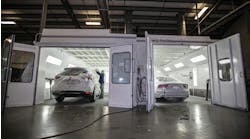A123Systems, an automotive technology company and battery supplier based in Watertown, Mass., is currently testing its Hymotion L5 conversion kit, which can turn a second-generation Toyota Prius into a plug-in electric car. The kit works with Prius model years 2004 through 2008 and adds a special, range-extending lithium-ion battery to the vehicle's existing drive train. This allows the Prius, which normally runs short distances at slow speeds on electric power alone, to extend its electric-only range and boost gas mileage to more than 100 miles per gallon. An added plus is that it is very inexpensive to fully charge A123's innovative 5 kilowatt-hour battery, with some estimates boasting that the price-per-charge would cost less than a dollar.
According to Craig Van Batenburg, owner of the Automotive Career Development Center (ACDC) in Worcester, Mass. and the nation's leading hybrid guru, these conversion kits are tailor-made for people who do "city driving," that is, for people who drive the city streets at 30 to 40 mph, without having to travel on an expressway. But the kit is not cheap, nor is the installation.
"This is a $10,000 option that doesn't include installation," Van Batenburg says. "But it will enable the right person to run their car on electric power, off the grid. Once the electric battery runs low, the 'regular' battery starts up and begins running, and you have the same car you had before — with an extra weight penalty. But there's a long waiting list for people to get this kit installed; in some cases, the list is as long as six months to a year."
The extra weight penalty Van Batenburg references is the lithium-ion battery pack (complete with crash sensor and emergency shut-off switch) that A123 Systems places in the trunk of the Prius during the conversion process. In addition to the extra weight, the A123 removes the spare tire to seat the battery pack, and loses cargo space once the conversion is complete — which some consumers may view as a negative.
The Hymotion L5 kit is due out this fall and will include a three-year warranty as well as installation at an authorized dealer — six of which are currently in existence. However, the company says it plans to add more authorized dealers across the nation to install the kit on second generation Priuses and service the growing demand for such conversion kits.
Poulsen Hybrid, a small company based in Shelton, Conn., is also offering a conversion kit that will transform any conventional car — not just a Prius — into a plug-in hybrid electric vehicle. Originally, the company intended to offer the kit to DIYers, but has since decided that only a network of properly trained and authorized dealers should do the conversions. Poulsen's kit, due out this fall, will retail at $3,500 and installation will cost between $500-$600.
The Poulsen system works by mounting small electric motors onto the rear wheels. It also uses a lithium-ion battery pack that will double a car's gas mileage, says Poulsen. Although the company hasn't released data on how far the system will go on a single charge, it claims that charging the battery pack will cost less than a dollar. However, the company does plan to offer a traditional lead battery with the kit to keep the total cost of the conversion down.
David Taylor, owner of Taylor Automotive in Sanford, N.C., believes that these conversions are the only effective way to help the U.S. reduce its dependence on foreign oil. Taylor recently attended the Plug-in Conference in Washington, D.C., where speaker Alan Madian, director of LECG — a global expert services firm — stated that the best industry forecasts on record for adding hybrid- and alternative-fueled vehicles to the nation's fleet still project drivers using more oil in 2035 than they do today.
"Madian said the only way to reduce our oil usage is to convert the existing fleet," Taylor says. "Still, I think these conversions should never be a DIY product or we will have many issues related to the high voltages come back and bite us. This would give the whole process a bad name with the public and set us back years in getting products to market."
But even with the kits from A123 Systems and Poulsen Hybrid in the pipeline, Taylor says there are no companies working to create a true aftermarket conversion kit that independent repair shops can install on all vehicles. To remedy this situation, Taylor recently formed a new company, Re-Involt Technologies, which will convert medium-duty delivery trucks — many of which are in service in the nation's fleet — into plug-in hybrid electric vehicles. Taylor's goal is to have a commercially available kit available at the end of 2008 and to sell it only to companies that have sent their technicians to a training session so that the installations will be done correctly and safely.
Taylor says he's had the design for this product in his head for several years, but the price of fuel did not really make it a practical option. However, now that fuel is so expensive and there is a true need for such a product, he's going ahead with it. To prove that his idea would work, Taylor converted a 2005 Dodge Ram 1500 crew cab, one of the biggest gas guzzlers in the standard truck category. After the conversion, Taylor's mpg went from 12-12.6 mpg around town to 22.5-33.7 mpg — depending on whether or not he runs the air conditioning.
However, like Van Batenburg, Taylor believes the cost of such conversions may make the process prohibitive for some drivers.
"Hybrid conversion kits are possible for regular drivers, but the current costs will turn most away," he adds. "I've converted my 2005 Dodge Pickup to a PHEV and get great mileage around town, but the price to convert a vehicle for the average consumer would be close to $18,000. With a price tag like that, the desire to convert a vehicle will need to come from a consumer's desire to change his or her carbon footprint. This is why we have chosen to pursue the conversion of commercial vehicles, because they can realize a return on investment based on the amount of miles driven each year."
But not everybody agrees that these plug-in conversion kits are a good idea. The California Air Resource Board (CARB), for example, is currently considering new certification standards for plug-in hybrid conversions that could make it more costly for companies to enter the market. A draft proposal calls for companies that convert regular hybrids into plug-conversions to undergo emissions testing on par with new-vehicle tests. It also requires manufacturers to provide warranties of seven to 10 years for different parts and installers to provide warranties for incorrect installation.
Some plug-in hybrid advocates claim the requirements, if passed as proposed, could be a big barrier to putting plug-in hybrids on the road in California. They fear the requirements could push the technology back a couple of years, even though buyers don't want to wait for major automakers to bring the vehicles to the market in 2010.
Taylor, however, is not worried about the legislation affecting California drivers, or drivers in other states if they follow California's lead.
"The new legislation will not have any affect on converting 'non-hybrid' vehicles to PHEVs," he says. "The proposal, as written, is specific to hybrid electric vehicles being converted to PHEVs."
Taylor adds that the law is mainly aimed at conversions that modify a vehicle's OBD system to change its warm up cycles. But because federal emission laws already prohibit a technician — or DIYer — from tampering with vehicle emission devices, he's not sure that separate legislation is needed to cover this emerging technology.
Van Batenburg also agrees that the law makes sense, in theory, but says it could be difficult to enforce it.
"When you modify any automobile, it has to be as clean as it was before you modified it. The problem is enforcing that standard," he philosophizes. "How do you know what everyone is doing in their own backyards?"



